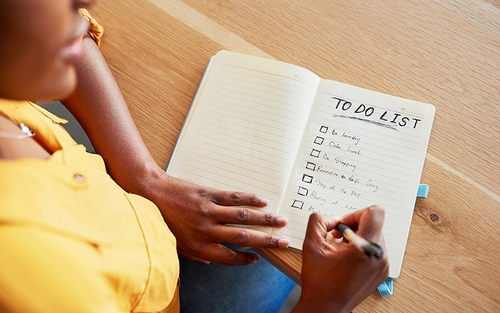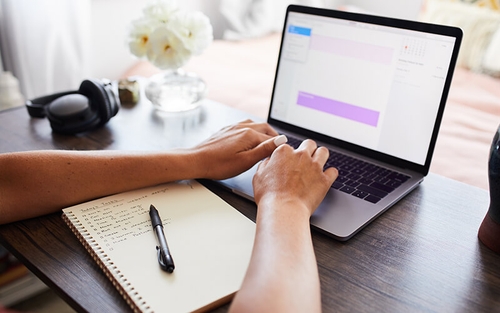Energy management at work: A guide to optimizing your workday


By The Schneider Guy
Estimated reading time: 5 minutes
Do you find yourself reaching for caffeinated drinks to stay awake every day? It may be time to put down your coffee and begin managing your energy at work in a healthier way.
Having low energy at work can lead to low productivity and poor job performance, but you can change this by following a few simple tricks. Here's our guide to bettering your energy management at work.
Energy management vs. time management
Energy management and time management work hand in hand to optimize your workday productivity. Managing your time ensures you have enough space in your schedule to get a task done, while managing your energy ensures you have the stamina to complete it.
Let's say you set aside an hour at the end of a workday to complete an important task. Since it’s the end of the day, you have little energy. You finish the task, but it takes 30 minutes longer than it should have and it wasn’t done to the best of your ability. Although you managed your time in this situation, you could have done a better job managing your energy.
Ways to increase your energy management at work
1. Pace yourself to avoid burnout.
Implement personal energy management into your routine by treating your workday as a marathon rather than a sprint. It may feel satisfying to cross tasks off your to-do list, but rushing through projects will likely lead to burnout.
To mitigate burnout:
- Create a prioritization list, determine which projects need to get done first and work through them one by one.
- As you work through your tasks, take short, regular breaks. If you're staring at a computer screen for most of your workday, give your eyes a break by stepping away from it for a few minutes.
- Schedule time in your day to take a longer break for lunch. This will refresh your energy going into the afternoon.
2. Plan your schedule around when you have high and low energy.
To manage your energy levels throughout the day, determine when you normally feel most and least energetic. If you feel the most energized in the morning, block off this time to work on your most demanding tasks. Minimize all distractions to be as productive as possible.
This strategy allows you to build time in your schedule for recovery when you’re going through a lull. When you have low energy, take more frequent breaks and build habits that boost your energy.
3. Engage in energy-boosting activities.
Use your breaks strategically by doing things that revitalize you. Determine what activities give you the most energy by paying attention to how you feel throughout your day. Do you feel re-energized after eating a snack, after talking with a coworker or after spending a few minutes outside? Once you determine which activities boost your energy, incorporate them into your workday.
Here are some energy-boosting activities:
- Eat a healthy snack.
- Take a quick walk.
- Spend time outside.
- Declutter your desk.
- Socialize with coworkers.
- Drink coffee or tea in moderation.
4. Learn how to say "no".
If you're feeling overwhelmed and drained, it may be time to start saying "no" to new responsibilities. Saying "no" allows you to allocate more of your energy toward projects you're currently working on and improve the overall quality of your work. This will give you the capacity to make lasting commitments.
Make sure you're saying "no" for the right reasons. It will be transparent if you turn down a task out of laziness. Saying "no" should be rooted in the belief that your current responsibilities deserve all your attention and you don't have the capacity to take on more.
How to say "no":
- Thank them for thinking of you to take it on.
- Decline in a polite, yet straightforward way.
- Explain yourself.
- Offer an alternative solution.
How to have more energy after work
When you have important things to do after work, it's essential you have the energy. Practicing effective energy management doesn't have to stop when the workday is done. Here are three steps you should follow to manage your energy once you get home:
- Set work-life boundaries and detach from work-related activities at home. This means silencing your email notifications and closing your computer.
- Take part in activities that will fill you with energy before returning to work the next day.
- Make sure you're treating your body well at home. Eat a nutritious dinner, increase your physical activity and aim for 7-9 hours of sleep at night.
Looking for new things to do on your lunch break?
There are plenty of ways to mix up what you do during lunch. Here are seven activities to do at lunch that will help boost your afternoon energy.

Schneider Guy loves the "Big Orange." He's passionate about the trucking industry and connecting people to rewarding careers within it. He's been the eyes and ears of our company since our founding in 1935, and he's excited to interact with prospective and current Schneider associates through "A Slice of Orange."



